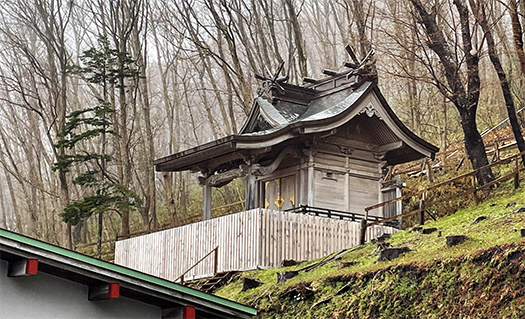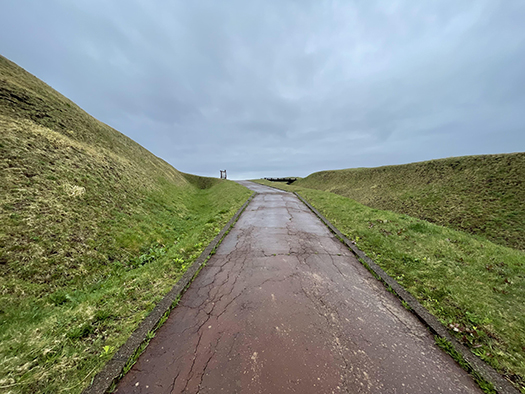

道南十二館という北海道島の歴史の中で、どうも縁遠いなぁと感じ続けていたテーマについてたまたま探訪の機会が得られたことで、いろいろな側面を見て来られた。
このコシャマインの戦い以降、有名なシャクシャインの乱などへと、北海道南部に蟠踞する中世以来の武家権力への交易の民アイヌ民族の抵抗・反乱行動は続いていく。この軋轢、政治・治安上の不安定要因は残念なことにながく継続した。最終的に明治維新による北海道島の日本領土確定からの国防的大量殖民・開拓事業の成功的実現によって、いわば歴史的には「止揚」された。
このことの解釈についてはいろいろな立場があり得ると思う。
わたし的に縄文の世から弥生農耕を開始し中央権力を確立して「国家」としての発展を遂げていった「日本社会」とアイヌ社会とが対比的に思われてならない。
日本社会は中国大陸で律令国家という、当時の感覚で言えば「世界標準」的政治システムが誕生して社会発展の中核として機能していくことに対応して、必然的に自主独立の気風が芽生えたと思う。さらに文字を持たない段階から漢字という文字を導入してその以前から存在していた「やまとことば」との整合性担保作業に、古事記編纂事業など国家権力そのものが強い使命感に燃えて取り組んでいった。
そういう作業は平安期に至ってまったく独自に「ひらがな・カタカナ」の発明までに達した。その間で「政治・軍事」という領域でも国家国民としての発展を遂げ、聖徳太子の政治外交姿勢「日出ずる国、日沈む国」を国際的に認定させるまでに至っている。
現代の研究では縄文まで遡れば、日本社会とアイヌ社会にそう大きな違いはなかった。しかし後方羊蹄に郡領を置いた阿倍比羅夫遠征などから始まったと思える日本社会の進出のなかで、この志苔館をめぐる戦闘局面に至っても、アイヌ社会側の「戦略」姿勢というのはよくみえない。
たしかにコシャマインの戦いは非道で不当な交易条件で虐げ続けられた側が「正義の名の下に」起こした戦役であったのだと思う。しかしたとえばコシャマイン側が戦闘で勝利したとして、その後の発展の方向性、政治の目指すべき未来構想はあったのだろうか、と疑問を感じさせられる。
道南十二館側は「一所懸命」思想による「御恩と奉公」原則によって主従関係・信用保証されるリアリズムの論理に基づいている。一方非道・不当の対手に対する「怒り」だけでは、戦争後の未来展望も開けていかないのではないだろうか。もちろん結果としてのコシャマイン側の敗走という歴史事実からだけ見た見方だろうことは承知の上。交易の民として、戦役の勝利後、どのような未来社会構想があったのか、あるいはなかったのか、知りたいと思っている。
探索した範囲では、アイヌ社会の「政治」構造についてすらあまり研究がされていないようだ。今後こうした研究領域が進展することを期待したい。
English version⬇
[Unknown “political warfare” strategy of Ainu society, Battle of Koshamain-4
Moshitora” is the current theme. It can also be translated as “If Kosha”. What kind of future could the Koshamain have offered if they had won this battle? …
I happened to have the opportunity to visit the Twelve Stations of Southern Hokkaido, a theme that I have always felt somewhat remote from the history of the island, and I was able to see various aspects of it.
After the Battle of Koshamain, the resistance and rebellion of the Ainu people, a trading people, against the samurai power coiled in southern Hokkaido since the Middle Ages, continued, including the famous Shakushain Rebellion. Unfortunately, this friction and political and security instability continued for a long time. Finally, the situation was “resolved” historically with the successful realization of the mass colonization and development of Hokkaido Island as a national defense project following the establishment of Japanese territory on the island by the Meiji Restoration.
There are many possible interpretations of this.
I cannot help but think of the contrast between the Ainu society and Japanese society, which developed as a “nation” by starting Yayoi agriculture from the Jomon period and establishing a central authority.
I believe that Japanese society inevitably developed a spirit of independence in response to the birth of the Ritsuryo state in mainland China, a political system that was the “global standard” in the sense of the time, and functioned as the core of social development. In addition, the state power itself, with a strong sense of mission, worked to ensure consistency with the “Yamato language,” which had existed before the introduction of Chinese characters from the stage of having no written language, through the compilation of the Kojiki (Records of Ancient Matters) and other projects.
This process culminated in the invention of hiragana and katakana in the Heian period. During this period, the nation also developed as a nation in the political and military spheres, leading to the international recognition of Prince Shotoku’s political and diplomatic stance, “Land of the rising sun, land of the setting sun.
Modern research shows that there were no significant differences between Japanese society and Ainu society as far back as the Jomon period. However, even in the midst of the advance of Japanese society, which seems to have begun with the Abenohirau expedition that established a county fiefdom in Yotei in the rear, the “strategic” stance of the Ainu society is not clear when it comes to the battle phase surrounding Shikokan.
It is true that the Battle of Koshamain was a battle fought “in the name of justice” by the side that had been oppressed by inhumane and unfair terms of trade. However, even if the Koshamain side had won the battle, one wonders if they would have had a direction for their subsequent development and a vision for their political future.
The Twelve Provinces side is based on the logic of realism, with the principle of “gratitude and dedication” based on the “single-mindedness” philosophy, which guarantees the relationship of master and servant and trustworthiness. On the other hand, “anger” alone against the inhumane and unjust hands will not be enough to open up the future prospects after the war. Of course, I am aware that this view is based only on the historical fact that the Kosher people lost the war as a result. As a trading people, we would like to know what kind of vision of future society they had or did not have after the victory in the war.
As far as I have explored, it seems that not much research has been done even on the “political” structure of Ainu society. We hope to see progress in this area of research in the future.
Posted on 5月 9th, 2024 by 三木 奎吾
Filed under: 歴史探訪







コメントを投稿
「※誹謗中傷や、悪意のある書き込み、営利目的などのコメントを防ぐために、投稿された全てのコメントは一時的に保留されますのでご了承ください。」
You must be logged in to post a comment.